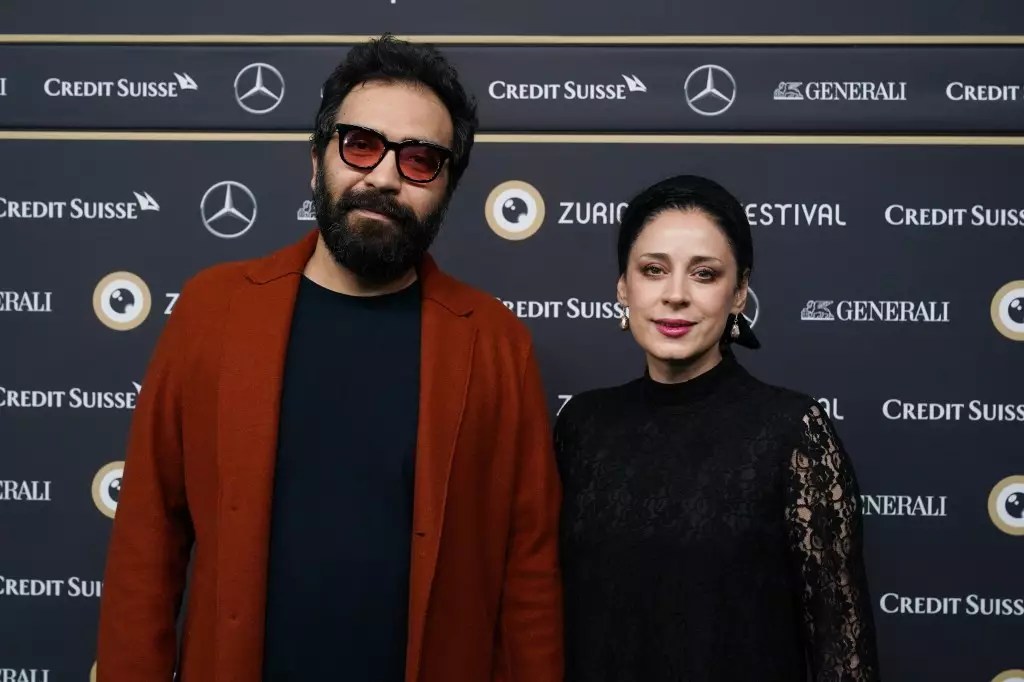The Iranian film industry has long been a source of artistic expression and cultural significance. However, the freedom of speech and artistic integrity of filmmakers in Iran are being increasingly threatened by the country’s hardline Islamist regime. Directors Maryam Moghadam and Behtash Sanaeeha, known for their critically acclaimed film “Ballad Of A White Cow,” have become the latest victims of this persecution. In an open letter signed by film organizations, festivals, and freedom of speech NGOs, calls have been made for Iranian authorities to drop all charges against the filmmakers and lift the travel ban imposed upon them.
Moghadam and Sanaeeha were due to travel to Paris to complete post-production on their upcoming film “My Favourite Cake.” This film delves into the life of an aging woman navigating her desires in a country where women’s rights are heavily restricted. However, their passports were confiscated at Tehran airport, and they were informed that they would be standing trial on undisclosed charges related to the film. Furthermore, Iranian security forces raided the home of the film’s editor, seizing crucial production material. The actions taken against these filmmakers are a clear violation of their creative freedom and expression.
The persecution of artists, writers, and cultural workers in Iran has been on the rise for the past two years as part of a broader crackdown on dissent. This suppression began before the Woman, Life, Freedom protests following the tragic death of Mahsa Amini in police custody. However, it has intensified in recent times as the Iranian authorities attempt to silence the pro-democracy movement. Alarmingly, Iran ranks second on the PEN America 2022 Freedom To Write Index list of top 10 jailers of writers and leads the list for the incarceration of female writers. The cases of director Saeed Roustayi, jailed journalist Narges Mohammadi, and rapper Saman Yasin, who claims to have been tortured while in jail, serve as further evidence of the Iranian regime’s suppression of artistic expression.
Filmmakers, writers, and artists play a crucial role in shaping free and vibrant societies. They act as architects of communication and collaboration, inspiring citizens to dream of better futures and fostering new ideas. Instead of stifling their voices, governments should celebrate and elevate artists for their invaluable contributions. Rather than perceiving artists as threats to national security, the Iranian authorities should recognize their role in promoting dialogue, empathy, and understanding.
The open letter signed by numerous film organizations and freedom of speech NGOs urgently calls upon the Iranian authorities to halt the relentless persecution of filmmakers, writers, artists, musicians, and all those who express the aspirations and dreams of the Iranian people. The filmmakers, Maryam Moghadam and Behtash Sanaeeha, must be allowed to continue their artistic endeavors without fear of reprisal. The charges against them must be dropped, and the travel ban lifted.
The directors have been notified that they will be tried by a judge connected to Evin jail, one of Iran’s harshest penitentiary institutions. This raises deep concerns about the fair treatment and safety of the filmmakers during the trial. Maryam Moghadam, who holds both Iranian and Swedish citizenship, has already faced travel restrictions and professional setbacks due to her involvement in controversial films. In 2013, she was banned from traveling for two years after starring in Jafar Panahi’s film “Closed Curtain.” In 2019, she was fired from a major Iranian film production at the behest of the Minister of Culture and Islamic Guidance. Such actions not only infringe upon artistic freedom but also hinder the growth and development of the Iranian film industry as a whole.
The persecution of filmmakers in Iran, exemplified by the case of Maryam Moghadam and Behtash Sanaeeha, stands as a grave threat to artistic expression and freedom of speech. It is imperative that authorities in Iran heed the calls from the international film community and human rights organizations to drop all charges against these directors and grant them the freedom to continue their creative pursuits. The time for change is now, as the world watches and demands that Iran truly values and protects the voices of its artistic community. Failure to do so will only lead to the further stifling of creativity and the loss of an essential element of Iranian society.


Leave a Reply